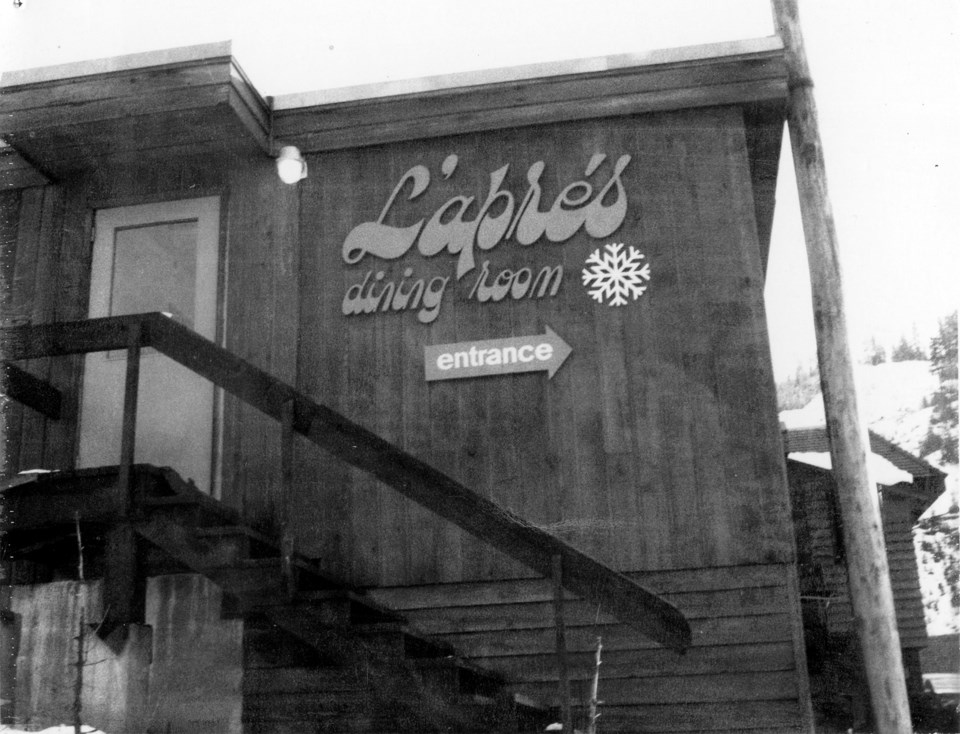With restaurants, bars, and even an annual beer festival (which just wrapped on Sept. 17), there are quite a few places in Whistler today serving alcohol. Whether through stories of Alex Philip sharing a few drinks with guests in the 1920s, the Witsend girls having gin delivered in a shoebox by train in the 1950s, or a homebrew contest getting established in the 1970s, we know that visitors and residents of the area have been bringing and making their own drinks for decades.
While searching through past editions of the Whistler Question, however, we came across a three-part series written by Stew Muir and Kevin Griffin in 1984 entitled “Bar War,” in which the two looked at the history of licensed establishments in the valley.
Liquor regulations in British Columbia meant until the mid-1950s, liquor could only be served in beer parlours, social clubs, and veterans clubs, and these venues had strict regulations around entertainment and food (both forbidden in beer parlours), as well as how liquor was served. According to “Bar Wars,” Rainbow Lodge got its licence after these regulations changed in the mid-1950s (years after Alex and Myrtle Philip had sold the lodge and retired), followed by Hillcrest Lodge in 1961.
After Whistler Mountain opened for skiing during the winter of 1965-66, ski lodges like Mount Whistler Lodge (formerly Hillcrest) and the Cheakamus Inn served guests and visitors in lounges and, in some cases, restaurants. The Christiana Inn, opened by Sandy and Puddy Martin in 1967, included a lounge and dining room and was reportedly the first establishment in B.C. licensed to serve liquor outdoors on its poolside patio.
When Garibaldi Lifts Ltd. opened L’Apres at the base of Whistler Mountain in 1968, it was not connected to any accommodations, and so was regulated differently than the lodges. According to Jack Bright, then the mountain manager for the lift company, L’Apres was granted a cabaret licence, which required that any alcohol be served with food and that patrons pay a fee to enter. A lift ticket was accepted as proof of payment, and L’Apres became known for fondue, though Bright recalled one RCMP constable who was not convinced fondue fulfilled the food requirements.
Through the 1970s, more options were opened to thirsty skiers (and non-skiers). The Ski Boot Motel, which opened in the late 1960s, added a beer parlour and dining room in 1972 and, according to Muir and Griffin, was the first place in Whistler to receive a licence to serve draft beer rather than bottled. (Though they don’t name their sources, “locals helped build the bar addition to the existing hotel in the early 1970s,” they also reported. “Some wanted the new pub so badly they worked for free.”) Restaurants such as Rudi’s Steakhouse were licensed to serve alcohol with meals, and in 1974, the Keg N’ Cleaver restaurant, better known as The Keg, opened on the shores of Alta Lake at Adventures West. The Highland Lodge received its liquor licence in 1978.
According to Allan Gould, at one time the general manager of the Liquor Control and Licencing Branch of B.C., the 1970s also saw the government bring in special recreational centre licences for ski resorts, and so the lift company was able to get a licence for the Roundhouse. Leo Lucas, who worked as a bartender at the Roundhouse, recalled they served only beer and wine, all poured into plastic cups to reduce the potential hazards of broken bottles.
By the time businesses began opening in Whistler Village in the 1980s, the regulations around liquor in B.C. had changed a lot from the requirements of the 1920s, and food and entertainment of various types could be found alongside liquor in pubs, bars and restaurants. Since Muir and Griffin’s “Bar Wars” series of 1984, regulations have continued to change, and many more licensed establishments have opened, closed and evolved in Whistler.




